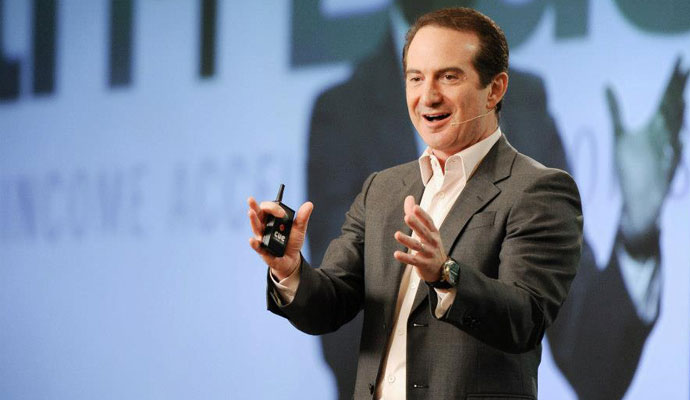How I'm planning for my dream retirement
Three retirement experts reveal their strategies

A free daily email with the biggest news stories of the day – and the best features from TheWeek.com
You are now subscribed
Your newsletter sign-up was successful

Have you ever envisioned what your life will be like in 20, 30, or 40 years — in retirement? Will you travel the world? Start a side gig? Spend the winter months at your second home...right on the beach?
There's no right or wrong answer. After all, dream retirements are a bit like snowflakes — no two are exactly alike.
There is, however, one thing that remains the same for everyone: fulfilling that wish list retirement requires some careful planning.
The Week
Escape your echo chamber. Get the facts behind the news, plus analysis from multiple perspectives.

Sign up for The Week's Free Newsletters
From our morning news briefing to a weekly Good News Newsletter, get the best of The Week delivered directly to your inbox.
From our morning news briefing to a weekly Good News Newsletter, get the best of The Week delivered directly to your inbox.
So whether you want to make homemade pasta in a Tuscan farmhouse or sail the Caribbean with your grandkids, you have to plot out how exactly you'll get there well before you clock in those last hours on the job.
Of course, planning that far in advance can be daunting, especially if you're still just trying to figure out how to balance all of your in-the-now financial priorities.
So we asked ourselves: Well, how do the pros do it — and what can we learn from them? And then we reached out to three well-known retirement experts for the skinny on their own goals for their golden years (spoiler alert: none of them plan to stop working completely), including the savings and investing strategies they're using to get there.
Read on to see what savvy tips you can potentially glean from them to help bring you one step closer to your own retirement dreams.
A free daily email with the biggest news stories of the day – and the best features from TheWeek.com
David Bach, 47, TV personality and author of the Finish Rich series

Bach grew up with an interest in personal finance — in fact, investing was a common topic at the family dinner table. His grandmother helped Bach buy his first stock at age 7. By 9, he was attending investment classes taught by his father, a financial advisor.
But it wasn't until Bach started working as a financial advisor himself that he realized the importance of retirement planning — experiences that led to his first book, Smart Women Finish Rich, which he followed up with nine New York Times bestsellers and his own radio program.
My dream retirement: I actually just came out of "retirement." About two years ago, I decided to "lean out" and take a year and a half sabbatical, where I lived as if I were retired. I love to ski, so I spent the bulk of the winter on the slopes. I also spent enormous amounts of time with family — I fished in Alaska with my father, and I went wine-tasting in Napa with my mom.
In between traveling, I was Mr. Dad. I got to experience waking up with my boys, Jack and James, and taking them to school. I was able to be involved in their school activities and make their team practices.
All in all, "pre-retirement" was glorious — but it also got what we traditionally think of as retirement out of my system. I live with too much purpose to just play. I need the "juice" that comes with helping others, especially when it comes to financial education. So I realized during this sabbatical that I will probably never fully retire.
That said, when my kids move on to college, my ideal schedule will include living in the mountains in the winter and the beach during the summer. I love Colorado, and could see spending my winters in Aspen. I usually write my books in the summertime, and I like to be at the beach when I work.
To me, the ultimate day in retirement would start with meditation, a workout, breakfast with the family, and then business for a few hours. If it's ski season, I'd then go skiing, followed by more business in the afternoon. In the summertime, I'd bike, play tennis, or golf. My nights would be devoted to spending time with family and friends.
My strategy for getting there: I recently became vice chairman of Edelman Financial Services, so I have a professionally managed, diversified portfolio through the company. I've been fully funding my retirement accounts since I was 27, and I have non-retirement investment accounts, too.
I've grown my money through systematic investing, maxing out my retirement accounts every year, and enjoying compound growth. I tend to recommend conservative portfolios, believing in a "boring," balanced approach to investments.
Another key aspect of my savings strategy: I have different accounts for different goals. I save money in three "baskets," including a retirement basket, a dream basket, and a security basket. I max out contributions to my retirement account basket, I save money in a dream account (this is what funded my sabbatical), and I have a security basket — a.k.a., an emergency savings account — of one year of expenses set aside.
I've spent 20 years helping people retire, and I think nothing is more important than having a plan that you are working towards. I know how lucky I am to have started so young — it has made a world of difference.
The sabbatical I took also really helped me re-think the concept of retirement. I used to want to retire early, but I realize now that I love to work. Still, having the option to not work makes working even better.
Nancy Collamer, 57, columnist for NextAvenue.org

Collamer is a career coach who initially focused on helping moms figure out how to work on a more flexible basis.
But as Collamer got older and became an empty nester, she realized that near-retirees also needed advice — especially given just how many of her colleagues and peers had questions about how to carve out new careers for themselves in retirement.
She even wrote a book on the topic: Second-Act Careers: 50+ Ways to Profit from Your Passions During Semi-Retirement. Today, the coach is also a regular career columnist for PBS's NextAvenue.org, a site dedicated to the 50-plus crowd.
My dream retirement: Right now, I work from home on a flexible basis and I'd like to continue doing that into retirement. My career is exciting and engaging — it gives me something to talk about and keeps my mind active. While I do intend to put in fewer hours, there is something tremendously powerful about having the structure of a work routine in your life — I believe it helps keep you young!
I have multiple streams of income as a writer, speaker and coach, and I have the ability to ramp any one of those up or down, depending on my situation. When I retire, I might dial everything down a notch, or I might concentrate on just one aspect of my career.
For example, I hope to travel more, so I might cut back on writing and focus on my speaking business. This way, I could plan trips around speaking engagements, reducing travel costs. On the other hand, if health issues make travel difficult, I might concentrate on writing instead.
My husband and I live in Old Greenwich, Connecticut, and love it — we have a lot of friends, and there's easy access to a lovely beach and good medical care. We might stay and downsize into a condo in retirement. But the cost of living is high, so we're also taking long weekends now to explore other areas — perhaps Chapel Hill or Durham, North Carolina, where my brother lives. We want to live in a multigenerational area surrounded by interesting people and enlivening conversation, rather than a retirement community where everyone is old.
On a day-to-day basis, I hope to incorporate all of the things I love most into my retirement plan: exercise, nature, and learning. I'll probably get involved in an adult education program, audit classes, or attend lectures at a local college. And I enjoy food and cooking, so I'd like to be able to go to the farmer's market, get fresh food and invite friends over.
I also plan to use my retirement to check things off my bucket list: Take a pastry course in France or Italy; do something in the creative arts, like photography or painting; train a therapy dog; and travel to such places as Nepal, India, and Greece.
My strategy for getting there: I work with a financial advisor who had me come up with my wish list for the future, as well as expected expenses, like my daughters' weddings. Based on that, he suggested a diversified portfolio to help maximize and protect my savings.
I re-adjust my investments a couple of times a year, and as I've been approaching retirement, I've been moving more money out of stocks and into bonds. I also keep cash in a savings account.
Financially, I'm right on track when it comes to achieving my vision. I've always been a careful saver who lived beneath my means and put aside the max into a 401(k). I'm at a point where college for my kids is paid, and the house is close to paid. My husband and I bought our house over 20 years ago and real estate values have gone up in our town. When we sell, the proceeds will help fund our retirement lifestyle.
Jan Cullinane, 60, co-author of The New Retirement: The Ultimate Guide to the Rest of Your Life

Cullinane's first career was as a science teacher for high school and community college students, but she reinvented herself at age 47 and became a retirement consultant after wanting to learn more about retirement herself.
The research and interviews that she conducted produced The New Retirement: The Ultimate Guide to the Rest of Your Life. And she followed that up with The Single Woman's Guide to Retirement, which focuses on the financial reality that many women face when they outlive their spouses.
My dream retirement: I'm actually living my retirement dream right now! I have multiple "slices" to my retirement pie, including family, work, volunteering, travel and focusing on myself. And I love juggling all of those at once.
When it comes to family, I make it a point to see my children and grandchildren every few months, even though we live hundreds of miles apart. And workwise, I continue to give talks on retirement, as well as write books and articles. I'm also on the board of trustees at my local library, serve on four committees in my community, and help out at a local food pantry.
I live in Palm Coast, Florida, where I moved about eight years ago. It's a place where I can age for years to come because it's a friendly, supportive community with high quality medical facilities, airports, lots of sidewalks, and good bike paths.
I also love to travel frequently because it contributes to my personal growth. I've been able to walk on the Great Wall of China, hike to the bottom of the Grand Canyon, gaze upon the Sphinx, and explore a good number of beautiful national parks.
There really is no typical day for me. I might give a radio interview, attend a community meeting, and play a game of tennis one day. The next, I might Skype with my grandson, write a blog post, and then fly to New York to do a talk. But I always try to work on one or two slices of my pie each day.
Throughout the rest of my retirement, I hope to continue to grow as a person and as an expert — helping others, maintaining close family and social ties, and ensuring that I won't run out of money before running out of life.
I have basically lived by these tenets: Live slightly below your means; always be in a position where you can support yourself; pay off your credit cards in full every month; find something you enjoy doing to stay physically and mentally fit; and develop a wide range of interests and a close social group. One of my favorite quotes? "Do one thing every day that scares you."
My strategy for getting there: My savings are primarily stock index funds and ETFs. I was fully invested in the stock market during the heady days. Even though there were tough times, I stayed invested, and the market has since rebounded and been good to me. I know I'm in it for the long haul, so I ignore the daily vagaries and only check my accounts quarterly. And as a woman with a hopefully long lifespan, I plan to take Social Security at my full retirement age.
I also do something called "mental accounting," which is when you split up your money and allocate it to different purposes. But rather than create separate accounts for various retirement goals, I use a spreadsheet with projections and allocations for areas like insurance, travel, food, cars, housing, clothing, medical costs, gifts, and emergencies. I pretend these are separate and distinct accounts — that they are not just on paper — and I don't dip into or borrow from the "wrong" one.
Right now, I'm on target and living my vision. I recognize that a lot of this is luck: I'm healthy, I've been employed since I was 16 — and I'm married to a great guy who did well, and we share the same money mindset.
This story was originally published on LearnVest. LearnVest is a program for your money. Read their stories and use their tools at LearnVest.com.
More from LearnVest...
-
 Why is Prince William in Saudi Arabia?
Why is Prince William in Saudi Arabia?Today’s Big Question Government requested royal visit to boost trade and ties with Middle East powerhouse, but critics balk at kingdom’s human rights record
-
 Wuthering Heights: ‘wildly fun’ reinvention of the classic novel lacks depth
Wuthering Heights: ‘wildly fun’ reinvention of the classic novel lacks depthTalking Point Emerald Fennell splits the critics with her sizzling spin on Emily Brontë’s gothic tale
-
 Why the Bangladesh election is one to watch
Why the Bangladesh election is one to watchThe Explainer Opposition party has claimed the void left by Sheikh Hasina’s Awami League but Islamist party could yet have a say